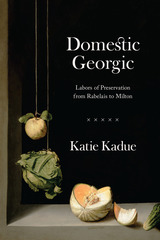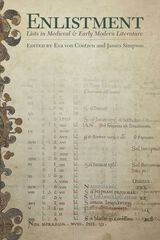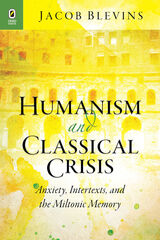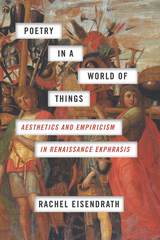5 books about 15th and 16th centuries

Digital Pedagogy in Early Modern Studies
Method and Praxis
Edited by Andie Silva and Scott Schofield
Iter Press, 2023
A collection of essays on early modern digital humanities by leading scholars in the field.
This collection of essays focuses on teaching at the intersection of early modern literature, book history, and digital media. It considers how teaching different fields and methods of study can be enhanced and facilitated by digital technologies. The volume provides a snapshot of current thinking on digital pedagogy as practiced by leading scholars in the field and offers a series of models that may be adapted, personalized, and repurposed by future teachers seeking to bring digital methodologies to their classrooms. Supplementary materials for this title are available on the Iter Press website (iterpress.org): see under Books/Supplementary Materials.
This collection of essays focuses on teaching at the intersection of early modern literature, book history, and digital media. It considers how teaching different fields and methods of study can be enhanced and facilitated by digital technologies. The volume provides a snapshot of current thinking on digital pedagogy as practiced by leading scholars in the field and offers a series of models that may be adapted, personalized, and repurposed by future teachers seeking to bring digital methodologies to their classrooms. Supplementary materials for this title are available on the Iter Press website (iterpress.org): see under Books/Supplementary Materials.
[more]

Domestic Georgic
Labors of Preservation from Rabelais to Milton
Katie Kadue
University of Chicago Press, 2020
Inspired by Virgil’s Georgics, this study conceptualizes Renaissance poetry as a domestic labor.
When is literary production more menial than inspired, more like housework than heroics of the mind? In this revisionist study, Katie Kadue shows that some of the authors we credit with groundbreaking literary feats—including Michel de Montaigne and John Milton—conceived of their writing in surprisingly modest and domestic terms. In contrast to the monumental ambitions associated with the literature of the age, and picking up an undercurrent of Virgil’s Georgics, poetic labor of the Renaissance emerges here as often aligned with so-called women’s work. Kadue reveals how male authors’ engagements with a feminized georgic mode became central to their conceptions of what literature is and could be. This other georgic strain in literature shared the same primary concern as housekeeping: the necessity of constant, almost invisible labor to keep the things of the world intact. Domestic Georgic brings into focus a conception of literary—as well as scholarly and critical—labor not as a striving for originality and fame but as a form of maintenance work that aims at preserving individual and collective life.
When is literary production more menial than inspired, more like housework than heroics of the mind? In this revisionist study, Katie Kadue shows that some of the authors we credit with groundbreaking literary feats—including Michel de Montaigne and John Milton—conceived of their writing in surprisingly modest and domestic terms. In contrast to the monumental ambitions associated with the literature of the age, and picking up an undercurrent of Virgil’s Georgics, poetic labor of the Renaissance emerges here as often aligned with so-called women’s work. Kadue reveals how male authors’ engagements with a feminized georgic mode became central to their conceptions of what literature is and could be. This other georgic strain in literature shared the same primary concern as housekeeping: the necessity of constant, almost invisible labor to keep the things of the world intact. Domestic Georgic brings into focus a conception of literary—as well as scholarly and critical—labor not as a striving for originality and fame but as a form of maintenance work that aims at preserving individual and collective life.
[more]

Enlistment
Lists in Medieval and Early Modern Literature
Edited by Eva von Contzen and James Simpson
The Ohio State University Press, 2022
Bestiaries. Lapidaries. Lunaries. Inventories and household vocabularies. Lists are everywhere in medieval and early modern texts––evidence of the need to manage and order knowledge and experience. Yet until now, listing as a formal practice has received scant scholarly attention. In Enlistment, foremost medievalists and early modernists from both the Anglo-American and German traditions investigate the humble list as a platform for better understanding how and why lists captivated period audiences. From epic catalogues of trees in Geoffrey Chaucer and Edmund Spenser to genealogies and the names of the divine, the lists in question come from a variety of periods, languages, and genres. Throughout, contributors demonstrate how lists have the curious capacity to challenge our categories of thinking and ordering of the world. The lists we encounter in medieval and early modern literature can thus be seen as seismographs of cultural knowledge and also as testing grounds for defining the ineffable, or unfathomable, or that which would be dangerous if otherwise expressed.
Contributors: Suzanne Conklin Akbari, Ingo Berensmeyer, Eva von Contzen, Alex Davis, Andrew James Johnston, Wolfram R. Keller, Alexis Kellner Becker, Kathryn Mogk Wagner, Martha Rust, James Simpson
Contributors: Suzanne Conklin Akbari, Ingo Berensmeyer, Eva von Contzen, Alex Davis, Andrew James Johnston, Wolfram R. Keller, Alexis Kellner Becker, Kathryn Mogk Wagner, Martha Rust, James Simpson
[more]

Humanism and Classical Crisis
Anxiety, Intertexts, and the Miltonic Memory
Jacob Blevins
The Ohio State University Press
While earlier critics have demonstrated significant insight into the relationship between the classical world and the early modern period, Humanism and Classical Crisis: Anxiety, Intertexts, and the Miltonic Memory, by Jacob Blevins, offers a new psychoanalytic approach to understanding classical reception, specifically during the early modern period. Blevins asserts that influence and imitation are primarily driven by anxious desires to identify the poetic self with the past while simultaneously affirming the autonomy and individuality of the self within its own cultural, ideological, and poetic moment. Since the poet cannot hold positions simultaneously in both past and present, anxiety irrupts as the poet fails to understand the fissures in his sense of identity and how that identity is articulated in poetic expression.
Blevins grounds his approach in the theories of Jacques Lacan, whose work challenges the very notions of what identity is and, as a result, exposes the complexities of identity formation. Areas and authors covered include imitations and translations of classical works of the sixteenth and seventeenth centuries in England and France by Andrew Marvell, Edmund Spencer, Pierre Ronsard, Joachim Du Bellay, Ben Jonson, Sir Thomas Wyatt, and John Milton.
This book not only provides a new perspective on early modern poetic imitation, but also offers a foundational methodology for examining the classical presence within the modern self.
Blevins grounds his approach in the theories of Jacques Lacan, whose work challenges the very notions of what identity is and, as a result, exposes the complexities of identity formation. Areas and authors covered include imitations and translations of classical works of the sixteenth and seventeenth centuries in England and France by Andrew Marvell, Edmund Spencer, Pierre Ronsard, Joachim Du Bellay, Ben Jonson, Sir Thomas Wyatt, and John Milton.
This book not only provides a new perspective on early modern poetic imitation, but also offers a foundational methodology for examining the classical presence within the modern self.
[more]

Poetry in a World of Things
Aesthetics and Empiricism in Renaissance Ekphrasis
Rachel Eisendrath
University of Chicago Press, 2018
We have become used to looking at art from a stance of detachment. In order to be objective, we create a “mental space” between ourselves and the objects of our investigation, separating internal and external worlds. This detachment dates back to the early modern period, when researchers in a wide variety of fields tried to describe material objects as “things in themselves”—things, that is, without the admixture of imagination. Generations of scholars have heralded this shift as the Renaissance “discovery” of the observable world.
In Poetry in a World of Things, Rachel Eisendrath explores how poetry responded to this new detachment by becoming a repository for a more complex experience of the world. The book focuses on ekphrasis, the elaborate literary description of a thing, as a mode of resistance to this new empirical objectivity. Poets like Petrarch, Spenser, Marlowe, and Shakespeare crafted highly artful descriptions that recovered the threatened subjective experience of the material world. In so doing, these poets reflected on the emergence of objectivity itself as a process that was often darker and more painful than otherwise acknowledged. This highly original book reclaims subjectivity as a decidedly poetic and human way of experiencing the material world and, at the same time, makes a case for understanding art objects as fundamentally unlike any other kind of objects.
In Poetry in a World of Things, Rachel Eisendrath explores how poetry responded to this new detachment by becoming a repository for a more complex experience of the world. The book focuses on ekphrasis, the elaborate literary description of a thing, as a mode of resistance to this new empirical objectivity. Poets like Petrarch, Spenser, Marlowe, and Shakespeare crafted highly artful descriptions that recovered the threatened subjective experience of the material world. In so doing, these poets reflected on the emergence of objectivity itself as a process that was often darker and more painful than otherwise acknowledged. This highly original book reclaims subjectivity as a decidedly poetic and human way of experiencing the material world and, at the same time, makes a case for understanding art objects as fundamentally unlike any other kind of objects.
[more]
READERS
Browse our collection.
PUBLISHERS
See BiblioVault's publisher services.
STUDENT SERVICES
Files for college accessibility offices.
UChicago Accessibility Resources
home | accessibility | search | about | contact us
BiblioVault ® 2001 - 2024
The University of Chicago Press









